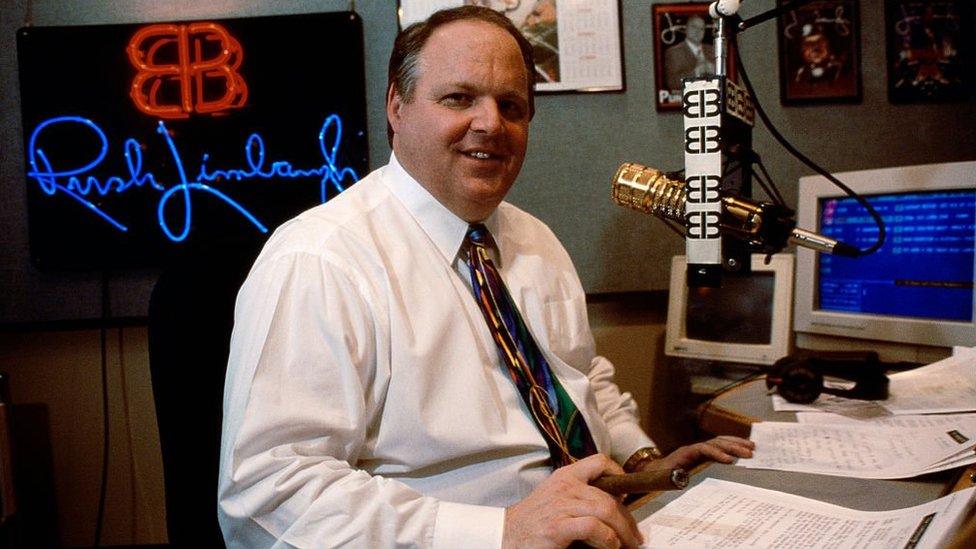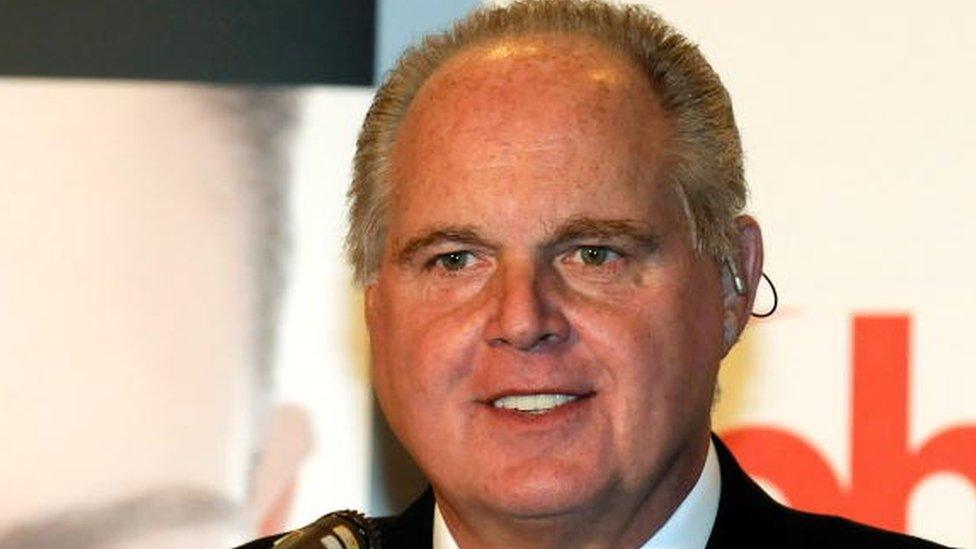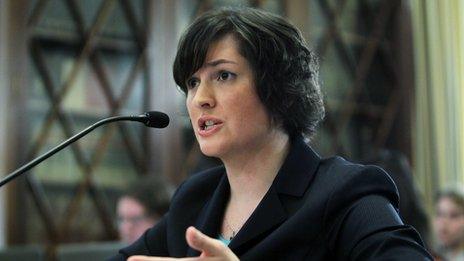Rush Limbaugh: Trump leads tributes to divisive US radio host
- Published
Radio host who courted controversy for decades
Donald Trump and other prominent US conservatives have been paying tribute to controversial radio personality and political commentator Rush Limbaugh.
The radio host's wife announced his death on Wednesday following his diagnosis of lung cancer last year.
Best known as the host of radio programme The Rush Limbaugh Show, the 70-year-old was a towering figure in the conservative movement for decades.
Mr Trump described him as a "legend" in his first post-presidency interview.
"There aren't too many legends around. But he is a legend," Mr Trump told Fox News. "And those people who listen to him every day, it was like a religious experience for a lot of people."
Limbaugh was as controversial as he was influential - accused of voicing racist, sexist and homophobic views throughout his career.
He was known for offensive characterisations of those whose politics he disagreed with and had a reputation for peddling conspiracy theories to his millions of listeners.
Mr Trump bestowed Limbaugh with the Medal of Freedom - the highest US civilian honour - in 2020.
A polarising figure
Born in 1951, Limbaugh got his start in radio in the 1980s and was on his way to stardom by the end of the decade when his show was syndicated nationally.
The Rush Limbaugh Show is widely considered the most-listened-to show of its kind with an estimated 15 million weekly listeners.
Limbaugh's wife Kathryn announced his death on the radio show on Wednesday.
"I know that I am most certainly not the Limbaugh that you tuned in to listen to today," she told listeners, before revealing he had died of complications from late-stage lung cancer.
Tributes have been pouring in from leading figures on the political right.

The Rush Limbaugh Show has been on the air since the 1980s
Mr Trump called into Fox News shortly after news of the death broke to pay tribute to what he called a "great gentleman, a great man" with "tremendous insight".
He told the network he had spoken with Limbaugh "three or four days ago" and said the host had been with him from the very beginning of his 2016 presidential campaign.
Just days after his impeachment acquittal, Mr Trump also again pushed the false narrative that victory had been stolen from him in the 2020 election, saying: "Rush thought we won, and so do I. I think we won substantially."
Mike Pence, the former vice-president, said the country had "lost a giant" with the host's passing while former President George W Bush described him as "an indomitable spirit with a big heart".
"While he was brash, at times controversial, and always opinionated, he spoke his mind as a voice for millions of Americans and approached each day with gusto," he said.
Although hugely popular among millions of American Republicans, the radio host was a deeply divisive and criticised figure.
He was known for sharing inflammatory views with his millions of listeners and pushing baseless conspiracy theories like casting doubt on ex-President Barack Obama's birthplace.
Even in his final months of broadcasting, he played down the coronavirus pandemic and touted unfounded claims of electoral fraud.
A White House spokeswoman said President Joe Biden's condolences went out to Limbaugh's family and friends.

The re-inventor of right-wing radio

There are few people more responsible for the current shape of US conservative politics than Rush Limbaugh. Before social media allowed the masses an avenue to speak outside the filters of mainstream media, Limbaugh did so by building a powerful talk radio megaphone essentially from scratch. And if he didn't invent the genre of right-wing populist radio punditry, he re-invented it for the modern era.
His daily radio programme, which expanded into a television and print empire, set the agenda for the Republican Party. He could make or break conservative political careers with a well-timed diatribe or words of praise. He turned back-burner issues into pressing topics of debate. He seemed to welcome controversy and fan the flames of political grievance, knowing they only helped his ratings.
He had listeners who tuned in because they loved his politics and listeners who did so because they hated him. He was seldom boring.
His critics - and there are many - will say he brought a level of toxicity and vitriol to American politics that has sharpened the nation's partisan divisions. His supporters will say his anger was righteous and he spoke to those the political elite ignored.
Either way, there's no understating the mark he left on American life.
- Published3 February 2020

- Published6 March 2012
